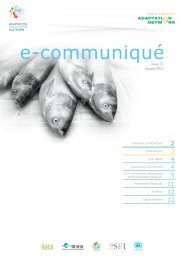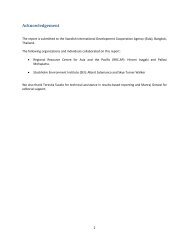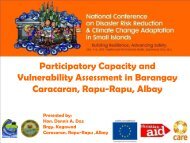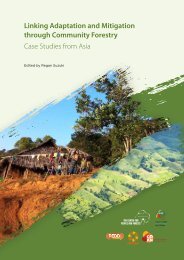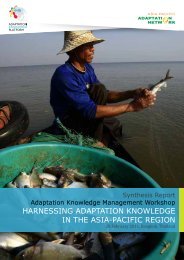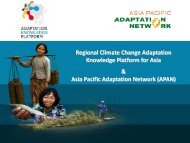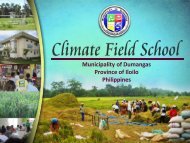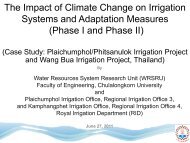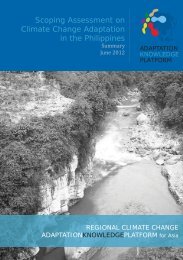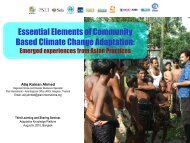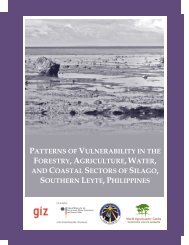Desktop Study on - Regional Climate Change Adaptation ...
Desktop Study on - Regional Climate Change Adaptation ...
Desktop Study on - Regional Climate Change Adaptation ...
You also want an ePaper? Increase the reach of your titles
YUMPU automatically turns print PDFs into web optimized ePapers that Google loves.
Assessment of Capacity Gaps and Needs of South East Asia Countries<br />
in Addressing Impacts, Vulnerability and Adaptati<strong>on</strong> to <strong>Climate</strong> Variability and <strong>Climate</strong> <strong>Change</strong><br />
ECHAM4 model and CCCMA’s First Generati<strong>on</strong><br />
Couple GCM. In the socio ec<strong>on</strong>omic sector, SEA<br />
START report makes an evaluati<strong>on</strong> of the impacts<br />
caused by climate change based <strong>on</strong> field interviews<br />
and group meetings; Dutta’s study, uses the surface<br />
and river comp<strong>on</strong>ents of the IISDHM model for flood<br />
inundati<strong>on</strong> simulati<strong>on</strong> and the AGENT-LUC Model<br />
(Anthropogenically Engineered Transformati<strong>on</strong>s<br />
of Land Use and Land Cover) for assessing the land<br />
use and land cover changes as result of the human<br />
activities.<br />
Related to this, should be included the development<br />
of technologies for adaptati<strong>on</strong>; the use and<br />
integrati<strong>on</strong> of traditi<strong>on</strong>al knowledge for developing<br />
adaptati<strong>on</strong> opti<strong>on</strong>s; integrati<strong>on</strong> of local knowledge<br />
and scientific knowledge for technology transfer;<br />
and communicati<strong>on</strong> of vulnerability and adaptati<strong>on</strong><br />
both to vulnerable communities and policy makers<br />
are also essential.<br />
Last, there is a need to build awareness about<br />
the potential impacts of climate change am<strong>on</strong>gst<br />
potentially affected people, and make stakeholders<br />
understand that they have to get involve in order to<br />
implement successfully measures <strong>on</strong> climate change<br />
adaptati<strong>on</strong>. There is also a need to develop and<br />
disseminate good quality informati<strong>on</strong>. Systematic<br />
efforts are required to study the impact evaluati<strong>on</strong><br />
of different climatic parameters (MRC, 2009).<br />
The following is the compilati<strong>on</strong> of the gaps found<br />
in the literature reviewed for water resources,<br />
agriculture and food security, socio ec<strong>on</strong>omics and<br />
risk management.<br />
Water Sector<br />
In water sector there is an urgent need to study<br />
changes in the rainfall pattern in all the watershed<br />
areas by using more than three climate change<br />
scenarios, and to incorporate the results in the<br />
government management plans. Besides, there are<br />
few studies in Thailand using mathematical models<br />
to assess physical property of water resource (water<br />
flow c<strong>on</strong>diti<strong>on</strong>s, element dispersi<strong>on</strong>, sediment<br />
transfer and accumulati<strong>on</strong>), for instance, to plan for<br />
water resource management; studies <strong>on</strong> biological<br />
diversity and the impacts of climate change <strong>on</strong><br />
water resources and fresh water ecosystems<br />
using mathematical models need to be included<br />
(Bo<strong>on</strong>prakrob and Hattirat, 2006).<br />
Agriculture and Food Security Sector<br />
There is a lack of studies about the most suitable<br />
species and varieties to face the changes in<br />
temperature and rainfall. The fact that different<br />
species have a unique capacity to endure heat means<br />
that it is essential to study individual species to find<br />
those that can best accommodate themselves to a<br />
changing climate (Bo<strong>on</strong>prakrob and Hattirat, 2006),<br />
and therefore, to be sure that rural households can<br />
adapt to the changes that are already happening.<br />
A c<strong>on</strong>servati<strong>on</strong> plan is needed in order to c<strong>on</strong>serve<br />
genes of wild species, as they possess characteristics<br />
that can overcome stress and enemies. On-going<br />
studies in Thailand <strong>on</strong> the impact of climate change<br />
<strong>on</strong> the Mek<strong>on</strong>g river basin utilize <strong>on</strong>e regi<strong>on</strong>al<br />
climate model incorporated with CERES crop<br />
model to predict the yields of a single variety of<br />
ec<strong>on</strong>omically important crops such as rice, corn,<br />
sugar cane and cassava. Other climate change<br />
scenarios are necessary for such studies in order to<br />
apply appropriate adaptati<strong>on</strong> strategies to minimize<br />
the impact of climate change.<br />
For livestock producti<strong>on</strong>, it is necessary to enhance<br />
understanding and to predict the future producti<strong>on</strong><br />
of meat and dairy products under climate change<br />
c<strong>on</strong>diti<strong>on</strong>s are needed.<br />
Socio-ec<strong>on</strong>omic Sector<br />
In Thailand, as a developing country, the issue of<br />
climate change has been given little attenti<strong>on</strong> with<br />
a more reactive approach rather proactive <strong>on</strong>e;<br />
specifically if it is compared to the development<br />
c<strong>on</strong>cerns such as poverty alleviati<strong>on</strong>, ec<strong>on</strong>omic<br />
growth and envir<strong>on</strong>mental degradati<strong>on</strong>. But, climate<br />
change is str<strong>on</strong>gly linked with ec<strong>on</strong>omic activities<br />
central in modern societies: energy producti<strong>on</strong><br />
and c<strong>on</strong>sumpti<strong>on</strong>, transportati<strong>on</strong>, and so <strong>on</strong>.<br />
Therefore, it should not be dissociated from the<br />
fundamental c<strong>on</strong>cerns of human society, such as<br />
nati<strong>on</strong>al ec<strong>on</strong>omic planning, public administrati<strong>on</strong><br />
and human development (Permpibul and Routray,<br />
2009).<br />
Also, as has been seen in the studies reviewed, the<br />
role of community level measures has declined or<br />
been neglected for household level and nati<strong>on</strong>al<br />
level (Snidv<strong>on</strong>gs, 2006). Current resp<strong>on</strong>ses to<br />
extreme climatic events are viewed more as disaster<br />
preparedness and mitigati<strong>on</strong> opportunities rather<br />
than as warning signals of much needed l<strong>on</strong>g-term<br />
adaptati<strong>on</strong>. Existing climate change models do not<br />
provide c<strong>on</strong>clusive assessments of the associated<br />
impacts at local levels. Therefore there is a need<br />
for a bottom-up approach to address the level of<br />
vulnerability to the existing and future impacts<br />
to improve adaptati<strong>on</strong> alt local level in the l<strong>on</strong>g-<br />
103



